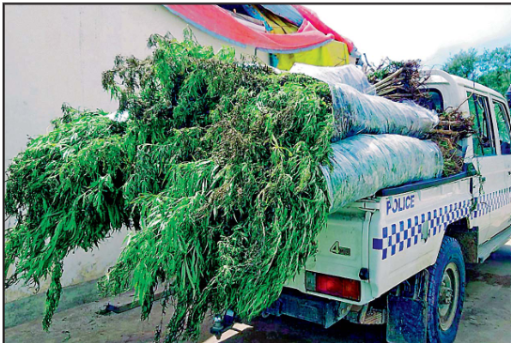IF 45,000 cannabis plants were uprooted on Kadavu then it clearly means that these farmers had a market for a conservative estimate of 2.5tonnes of product.
And we know that we are not currently exporting cannabis!
The obvious then is that, if we take into account all other raids happening throughout Fiji, the fact is Fiji clearly is already a recreational cannabis smoking nation!
This explains the optimistic approach for the continued farming of cannabis. It’s not just because there are no easier and legal alternatives provided for making money, but it is because the farmers know they have a local market which caters to the easiest and fastest way out of poverty.
And that is the bottom line why our Fiji Police Force and vanua cannot control the production of locally-grown cannabis. And that is also the reason our farmers are willing to take the risk and brave the consequences of the current penalties which deprive them of a more comfortable and less burdensome lifestyle.
Cannabis or “Indian hemp” was likely introduced to Fiji following the 1879 introduction of Indian workers under the Indentured Labour Scheme. It was “Ordinance No. 21” which prohibited the “importation of Indian hemp, or any product or preparation therefrom, including gunjah, bhang, chavas, or any article which in the opinion of the Chief Medical Officer of the Colony at the time, was capable of substitution thereof.”
Unfortunately, I am unable to supply a date at this time of when Ordinance 21 was written which would provide a rough date of when cannabis first became illegal. For context, marijuana is currently a schedule 1 illegal drug in Fiji, according to the Illicit Drugs Control Act of 2004 while cannabis possession and consumption carries a mandatory three-month prison sentence for any amount up to 100 grams.
I now have a theory that Fiji is at a climax point where the development of a cannabis policy is well-founded and supported by current developments. Here is my logical analysis to the reason for the development of a cannabis policy.
Current state: The contradiction is real
Fiji faces a fundamental contradiction. The Cabinet approved the drafting of a medicinal cannabis legislation and a feasibility study in late 2024 while it simultaneously maintained a mandatory three-month prison sentence for any cannabis possession up to 100 grams.
Cannabis v alcohol: The harm comparison
Evidence strongly supports the relative harms in the comparison between cannabis which is illegal and alcohol which is legal as:
Cannabis impact in Fiji: Hospital admissions showed more for patients with marijuana issues compared with alcohol, but this statistic requires context. It may reflect enforcement patterns rather than actual harm levels.
Global research context: When it comes to harm to others, alcohol is considered to cause the most damage, and scientific evidence overwhelmingly indicates that cannabis is substantially less harmful than alcohol and should be treated as a social and public health issue rather than criminal.
The medical cannabis paradox
The legal inconsistency is crucial. A policy framework was approved in 2024 to explore medical cannabis for export only Fiji approved industrial hemp cultivation in 2022 (under 1 per cent THC).
Yet possession of any cannabis variety remains criminally punishable
This creates an untenable situation where the government will essentially be farming what it criminalises citizens for possessing.
Logical conclusion
Based on the evidence, Fiji appears to be following a path toward pragmatic reform rather than continued prohibition.
Economic Reality: The government recognises cannabis’s economic potential through medical export and industrial hemp programs
Enforcement Futility: As noted by policy analysts, “legalisation” need not mean recreational free-for-all use. Fiji could legalise for medicinal and hemp production while maintaining restrictions and controls on recreational use.
Social Justice: The current system creates disproportionate family separation and imprisonment for a substance less harmful than legal alcohol
International trends: Fiji is watching regional and global movements toward decriminalisation and medical legalisation
The logical path forward appears to be graduated legalisation:
Medical cannabis (already being considered) industrial hemp (already approved).
Decriminalisation of personal use (logical next step).
Regulated recreational market (longer-term possibility).
The obvious is Fiji cannot continue the current contradictory approach. The nation will likely need to choose a more coherent policy framework that acknowledges both the plant’s legitimate uses and the failure of current prohibition policies.
Fiji needs to recognise that selective legalisation (medical/industrial) of cannabis, while maintaining criminal penalties for the same plant, creates an unsustainable legal and social framework.
The time and money taken to travel, stay, get to farms, uproot cannabis plants and constrain the judicial system, may be better spent uprooting the production and supply chain of the extremely harmful hard drugs in Fiji for which has been now declared a national crisis!
We need to decide now. Are we for or against and what is the best and safest and most economical way out!
Its not like we have the dollars to throw around!
- NOLEEN BILLINGS is a regular contributor to this newspaper. The views herein are hers and are not necessarily shared by this newspaper.



